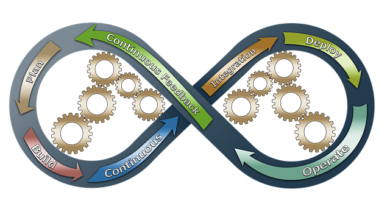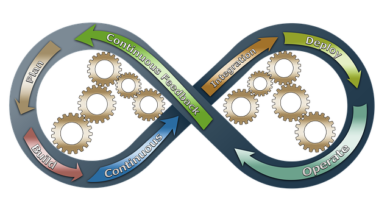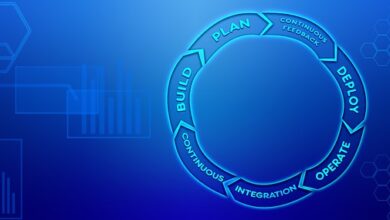Everything You Need to Know About DevOps
Have you ever thought about what do organizations like Google, WhatsApp, Microsoft, Slack, Skype, Opera, and Groove have in common? In addition to being multi-million dollar tech-giants, they adapt advanced IT practices like DevOps to stay ahead of their competitors and accomplish their desired objectives.
DevOps practices ensure timely completion of high-quality software products according to consumer needs. DevOps services encourage the faster release of product features through continuous communication, integration, and transparency between development and operations teams. The implementation of DevOps practices permeates every phase of the software development lifecycle.
The following article offers a complete overview of DevOps practices.
What is DevOps?
DevOps is a framework that combines development and IT operations to ensure continuous delivery and shorten the software development lifecycle without compromising the product quality. Most of the DevOps features have been derived from the Agile methodology.
The primary objective of implementing DevOps practices is to remove the communication barriers between development and operations teams. Better collaboration ensures faster delivery of high-quality software products and drives continuous process improvement. This way, companies can enhance consumer experiences and cement their long-term competitive edge over their rivals.
DevOps Methods
Three DevOps methods are the most popular among technology firms:
Kanban
Initially originated from higher productivity achieved by Toyota Motors, the idea of Kanban refers to displaying the real-time work in progress on a Kanban board. This allows software development teams to track the progress and timely identify bugs.
Scrum
In scrum, specific tasks are assigned to different teams who work together to complete these assignments to accelerate development. Some of the terms designated to scrum practices are time boxes, key workflows, and designated roles, etc.
Agile
Agile programming heavily influences DevOps methods including scrum and Kanban. Commonly used agile practices by IT companies are documentation, responsiveness to the ever-changing customer needs, continuous customer feedback, and daily standups.
DevOps Practices
DevOps practices focus on various phases of SDLC and drive continuous improvement and automation. These include:
Continuous Development
Continuous development incorporates the version-control mechanisms and coding phases of the DevOps lifecycle.
Continuous Testing
It involves testing automation practices to perform prescheduled code tests to speed the delivery of code to production.
CI/CD
The CI/CD practices combine configuration management and development tools to automate the delivery of code changes and timely resolve code issues.
Continuous Deployment
Continuous deployment also automates the code changes into production allowing the firm to release feature changes several times in a day.
Continuous Monitoring
In continuous monitoring, IT professionals can monitor the code being written in operation and supporting infrastructure. The bugs are reported by a feedback loop that sends the code way back to development.
DevOps Benefits
DevOps practices bring innovation to technology companies and improve the quality of their software products or services without stretching their budget constraints. Some of the core benefits of DevOps practices are given below:
- Faster delivery of high-quality software produces
- Greater automation
- Timely identification of bugs
- Reduced complexity
- Scalability and flexibility
- Greater visibility into system outcomes
- Innovation at organizational levels
- Improved stability in operating environments
- Higher customer satisfaction
- Better resource utilization
The Takeaway
DevOps practices have been employed by the leading technology firms across the globe for years. These practices improve collaboration between the development and operations teams to ensure continuous improvement. DevOps development companies like Khired Networks offer unrivalled expertise with reliability. Besides, DevOps technologies help IT professionals release necessary feature changes or additions in the future and meet their customers’ business needs by delivering high-quality software products.
Are you looking for a competent a trusted DevOps partner? Visit https://khired.com/services/devops/ to hire qualified and skilled DevOps engineers remotely and become an elite DevOps developer.



